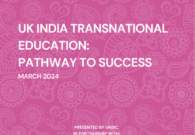Blog: A Reflection on the National Education Policy One Year On
The announcement of the long-awaited National Education Policy (NEP) last July marked the beginning of an exciting new era for the Indian education ecosystem. With the vision to create an equitable, inclusive and knowledge-based society fit for the 21st century, the NEP set out key recommendations to upgrade and transform the existing system. These reforms were centred around enhancing quality, universal access, better governance, holistic multidisciplinary education, teacher training, greater research focus and embedding technology in all aspects of education delivery. Its launch was greeted with widespread acclaim since this new policy has the potential to be a major gamechanger if implemented correctly.
As we celebrate its first anniversary, it is worth reflecting on the developments and progress of the NEP over the past year. Despite the challenges posed by the pandemic, the energy and momentum to fulfil the vision of the NEP remained undiminished within higher education stakeholders in India and the wider international circle.
Guided by the NEP, a slew of reforms have been introduced in the last year to enable the current education system to adapt and keep pace with the rapidly changing needs of students, academia, society and the 21st century workplace. These reforms seek to improve and facilitate open and distance learning programmes, online programmes, academic flexibility, promotion of regional languages, research and innovation, multidisciplinary learning and most importantly for UK institutions, internationalisation. This is because, compared to its predecessors, NEP 2020 strongly emphasises the importance of internationalisation and global alliances to uplift India’s education sector.
With the goal of internationalisation in mind, the Indian government started off by releasing a new regulation in August 2020 welcoming the top 100 globally ranked universities to set up campuses in India. This was followed by new rules in February 2021 which allow Joint Degree, Dual Degree and Twinning Programmes to strengthen the cross-border linkages in teaching, research, student exchange, knowledge transfer and skill development. Even better, the eligibility criteria here is much more flexible – it applies to the top 500 global institutions (rather than just the more restrictive top 100) which is a real step in the right direction.
Soon after, on 11th March 2021, the University Grants Commission released the regulation on the Establishment and Operation of Academic Bank Credits (ABC) which will provide a digital platform to store academic credits earned from various colleges and universities while awarding degrees. This mechanism will help simplify the accumulation, transferability and redemption of credits across a range of disciplines thus offering flexibility to manage credits both domestically and overseas. In a world where graduates and employees are consistently required to use skills from a range of disciplines, this transferability is most welcome.
The most recent announcement pertains to the guidelines on Internationalisation of Higher Education in India which aims to encourage Indian universities to ramp up their systems and structures to meet global standards and initiate international exchange of academic best practices, competencies and student mobility. This in turn, will catalyse greater dialogue and partnerships between Indian and foreign higher education institutions going forward. This policy is already having the desired positive impact —prompting several Indian States to reach out and forge collaborations with universities and higher education stakeholders in priority markets. A good example is the new partnership between Universities in Wales, the Welsh Government, British Council Wales and the Telangana State Council of Higher Education (TSCHE). These organisations have come together to enhance the arts and commerce curriculum and align it with industry standards as well as give scholarships to the brightest and best students from Telangana universities to enable them to study a Master’s degree at Welsh universities in 2021.
Taking all the above measures into consideration, it seems to us that one of the most significant achievements of the NEP till date is this radical and positive shift in mindset that it has set in motion – a move towards greater openness, collaboration, exchange of ideas, digital solutions and a real desire to work with new partners and experts across the globe. This is surely to be acknowledged and applauded.
As the reforms continue to be implemented, we can expect to see more knowledge-centric partnerships, commitments and opportunities emerging within the UK-India corridor. This, together with the deepening of ties between the UK and India under the 2030 Roadmap, the removal of trade barriers and greater cooperation, marks not just the one-year anniversary of the NEP but also the beginning of a new chapter in UK India bilateral relations.







